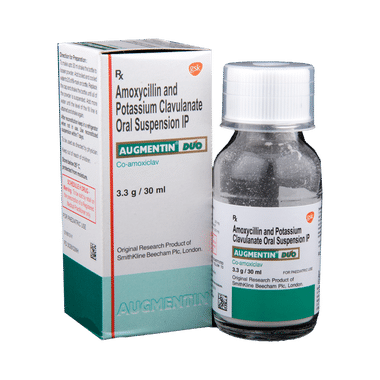All Details About Augmentin Duo Oral Suspension
Find out detailed description, uses, directions of use, side effects, warnings and precautions, frequently asked questions about Augmentin Duo Oral Suspension
Description:
Augmentin Duo Oral Suspension is an antibiotic medicine that helps treat bacterial infections of the ear, nose, throat, chest, lungs, teeth, skin, and urinary tract. It is capable of killing bacteria that have become resistant to other therapies and thus also helps treat tuberculosis that is resistant to other treatments.You can give Augmentin Duo Oral Suspension to your child with or without food. It is better to give it with food as that helps increase absorption and decrease the risk of stomach upset. The doctor may prescribe giving it two to three times a day. Medicine dose depends on the severity of the infection, its type, and your child’s body weight and age. So, stick to the dose, time, and way prescribed. If your child vomits the medicine within 30 minutes of intake, let the child calm down and repeat the dose. Do not double dose if it's the time for the next dose.
Augmentin Duo Oral Suspension may cause vomiting, diarrhea, nausea, abdominal pain, and allergy. These side effects should diminish on their own. But, in case they persist or start bothering your child, you must not delay speaking to your child’s doctor.
Share your child’s entire medical history with the doctor, including any previous episode of allergy, heart problem, a blood disorder, birth defects, airway obstruction, lung anomaly, gastrointestinal problem, skin disorder, liver impairment, and kidney malfunction. This information will assist the doctor in making dose alterations and in planning your child’s overall treatment.
Directions For Use:
Ordinary side effects of Augmentin
- Abdominal pain
- Allergy
- Vomiting
- Nausea
- Diarrhea
- Mucocutaneous candidiasis
Side Effects:
Augmentin Duo Oral Suspension does not pose serious side effects and is well-tolerated by children. In case the side effects do occur, they’re likely to subside once the body adapts to the medicine. Consult your child’s doctor if these side effects persist or bother your child. The most common side effects include-Warning & Precautions:
The dose also needs to be reduced in neonates and infants due to incompletely developed renal function.
Regular monitoring of liver function tests is recommended while you are taking this medicine
FAQs:
Q. Can other medicines be given at the same time as Augmentin Duo Oral Suspension?
Q. Can I get my child vaccinated while on treatment with Augmentin Duo Oral Suspension?
Q. Which lab tests may my child undergo while taking Augmentin Duo Oral Suspension on a long-term basis?
Q. Can I give a higher than the recommended dose of Augmentin Duo Oral Suspension to my child?
Q. Can I stop giving Augmentin Duo Oral Suspension to my child when the symptoms are relieved?
Q. Can the use of Augmentin Duo Oral Suspension cause diarrhea?
Q. Do all viral common colds result in secondary bacterial infection?
Q. The mucus coming out of my child’s nose is yellow-green. Is it a sign of a bacterial infection?
Q. Is there any sign which shows that my child needs immediate medical attention?
Disclaimer:
Getomeds primary intention is to ensure that its consumers get information that is reviewed by experts, accurate, and trustworthy. The information and contents of this website are for informational purposes only. They are not intended to be a substitute for professional medical advice, diagnosis, or treatment. Please seek the advice of your doctor and discuss all of your concerns about any disease or medication. Do not disregard or postpone seeking professional medical advice because of something you read on Getomeds. Our mission is to support, not replace, the doctor-patient relationship.
